IHG’s 5-Star Hotel Adopted Ragic: Less Overtime. Lower Staff Turnover. All While Cutting Operational Costs

| Company Name | InterContinental Kaohsiung |
| Industry | Hospitality |
| Benefits of Implementation | |
| Subscription Plan | Concurrent users |
| Scale of Use | More than 250 users, with over 250 workflows, used by all staff in the hotel |
“At the end of the day, the guest experience is always the principal. So I prefer that our team members have more time or better resources or skills to spend time with a guest and to make a real great human impact rather than sitting in an office and doing a task that could be automated.”
- Robbert Mannusen, Area General Manager Taiwan at InterContinental Hotels Group
InterContinental Hotels Group is one of the biggest hotel groups in the world, alongside Marriott and Hilton in market cap. In Taiwan, they’ve got 16 properties, including names you’ve probably heard of: Kimpton Da An, Regent Taipei, Holiday Inn Express Taichung Park. But today, we’re focusing on one in particular: InterContinental Kaohsiung.
As the first InterContinental Hotel in Taiwan, InterContinental Kaohsiung sparked the group’s digital transformation across the country. They’ve always been ahead of the curve, using AI voice assistants in the hotel room to enhance guest experiences or VR360 to do digital tours of the hotel. But what really sets them apart is how they brought that same spirit of innovation not only for the guest-facing experience, but also for their back of house operations.
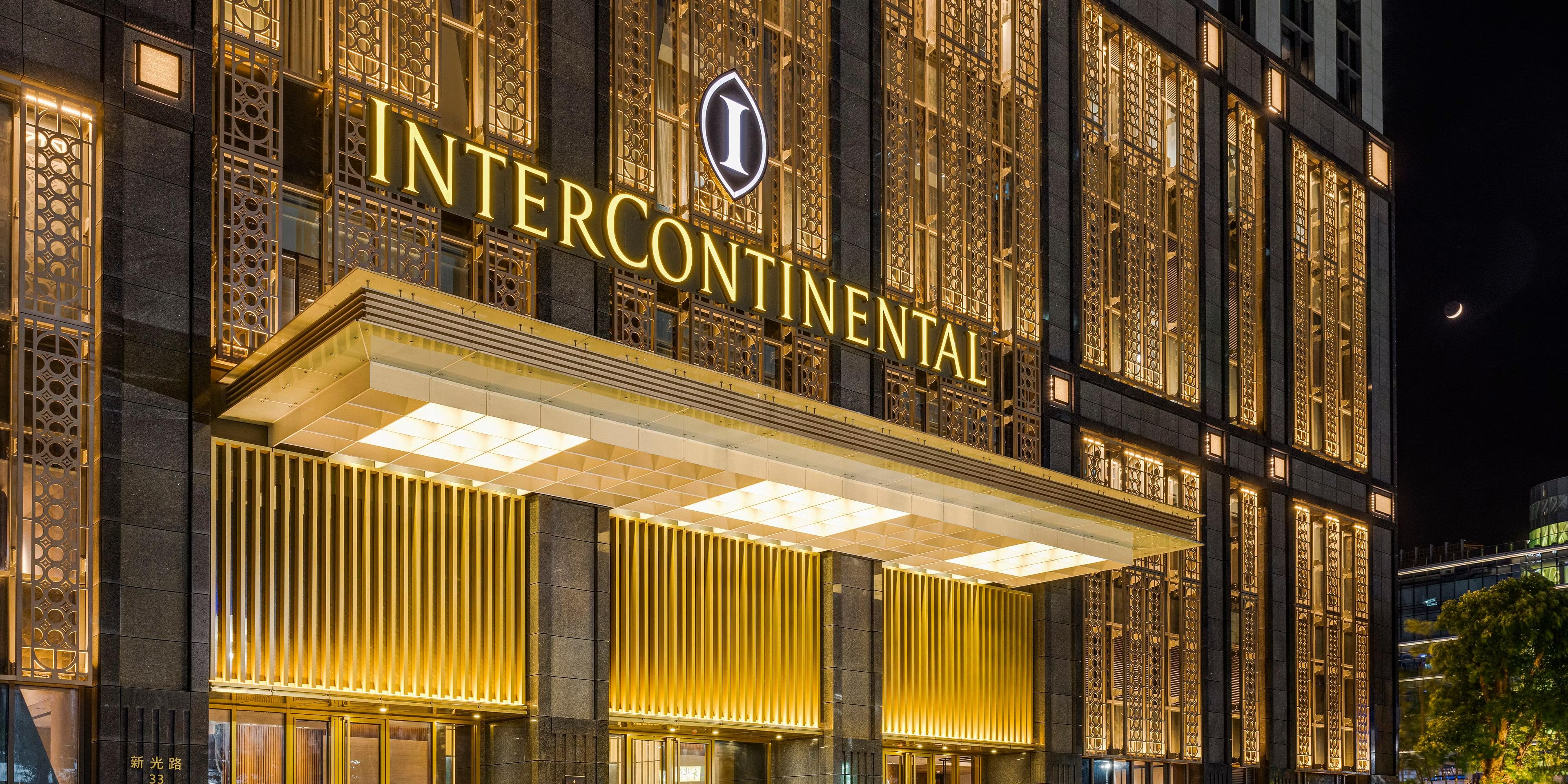
For their operation, they use a no-code tool called Ragic.
It started simple. They needed an approval system for their memos. That’s how they found Ragic. It was just a way to patch holes: things their existing system couldn’t handle. Small, niche workflows that kept slipping through the cracks, or ones that required endless paperwork to get done. But that small fix turned into something much bigger.
Something bigger that transformed their operations. Impact that even owners can see. Over the past three years of automation, InterContinental Kaohsiung has gradually reduced headcount in certain functions. The finance and business support team went from 15 to 11. The guest service center, which handles reservations and phone calls, went from 7 to 5. With better systems in place, some roles simply require less manpower, leading to significant cost savings, cutting over $135,000 USD annually.
At first, the implementation came from the top. But once the team got a feel for it, something shifted. It wasn’t just management calling the shots anymore. The team started coming up with their own ideas, building their own workflows, solving their own problems. Suddenly, everyone was part of it. They became what people like to call “citizen developers”—but really, they were just hotel staff who finally had the right tool to make their jobs easier.
Now, Ragic isn’t just patching holes. It’s powering the whole operation. It’s their digital backbone—from logging guest requests to running performance improvement plans, housekeeping checks, and staff onboarding. It’s even handling some of the fancier touches, like generating AI-powered welcome cards or integrated with RPA to capture customer data at exhibitions.
All of this helps them do what they do best: create a warm, luxurious experience for every guest. Just with a lot less stress behind the scenes.
Less stress behind the scenes. Is that even possible in hospitality?
It is, and it actually solves one of the biggest problems in hospitality: attracting and retaining talent.
Guest-facing tech has come a long way. Mobile check-ins and app bookings are the norm now. But the back-of-house is a different story. It’s usually the last place to see any real digital progress.
Most hotels are stuck with rigid legacy systems. Or a chain-mandated platform that’s supposed to “fit everyone,” which really means it fits no one perfectly. And that rarely changes. The gaps and uncovered workflows? They stay manual. Staff just have to work around them.
So now, on top of delivering high-touch service, they’re chasing down approvals, comparing spreadsheets, and tracking training records with paper and post-its.
Can you imagine the stress?
But have you ever imagined that clearing up those messy manual workflows can actually make a huge difference? We’re talking about solving one of the biggest problems in hospitality—especially in Taiwan—attracting and retaining talent.
InterContinental Kaohsiung is living proof. After adopting Ragic, their business support team leaves by 6. Their service team is backed by automation, ensuring no guest request slips through and service stays on track. No overtime. Real work-life balance. Staff feel less frustrated, more joyful at work, and turnover drops.
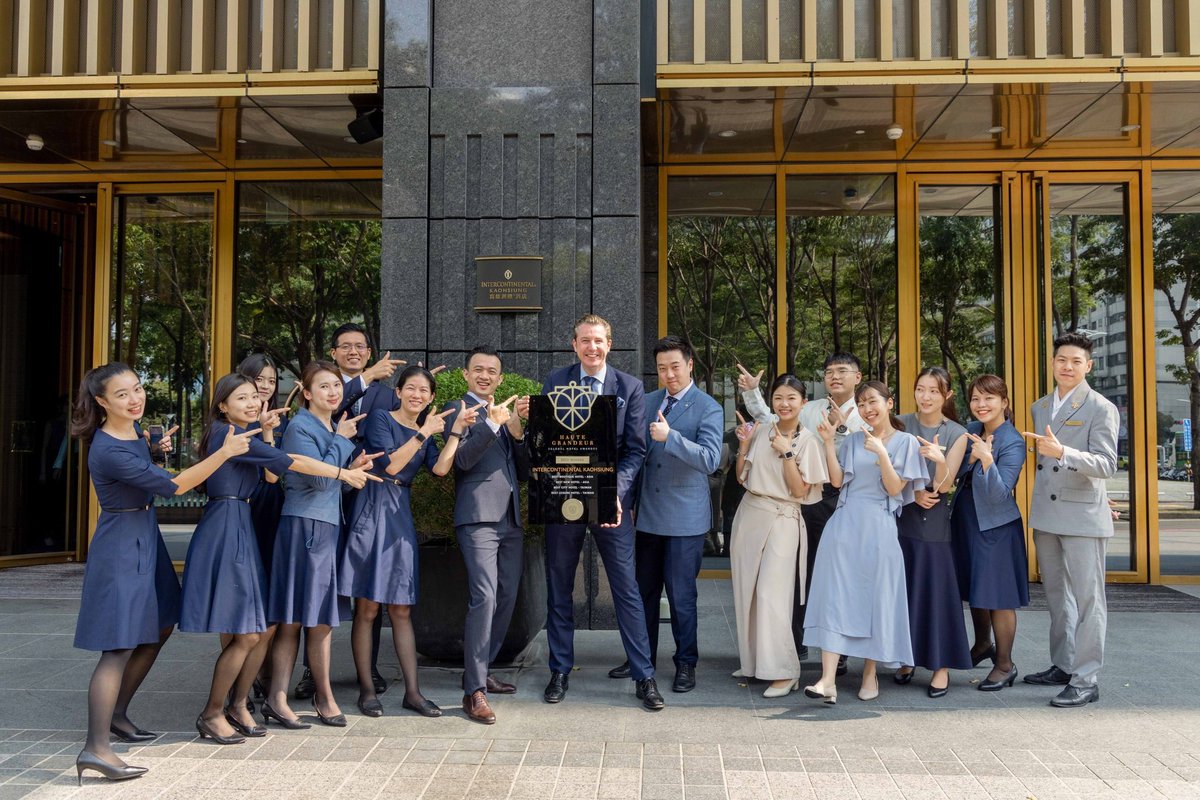
InterContinental Kaohsiung Staff
That’s just retention.
Tech like this also attracts younger talents. People who want to move fast, not spend their days stuck in front of a computer comparing reports. With this change, they could see a chance to grow, instead of just surviving.
Are those all the benefits?
Not even close.
Another major win is data.
With everything centralized, they now literally have data on everything—training records, performance metrics, and more. Decisions are faster and better informed. They can quickly understand what guests are looking for, and what the team really needs to do their best work.
And at the center of it all? Guest satisfaction.
With the right tools, staff can deliver service that feels effortless. And if you’re wondering how technology can actually improve service, not make it feel robotic, InterContinental Kaohsiung believes in one thing that we think is the crucial point of this adoption success: Technology isn’t here to replace human connection. It’s here to support it.
Technology helps the team work faster, with fewer mistakes. And with clear data, teams can make smarter decisions that keep service running smoothly.
Today, InterContinental Kaohsiung runs its entire operation in Ragic, with over 200 sheets in use. In most cases, covering this range of workflows—like RIMS, HR training and development, HRIS, CRM, and document management—would require a stack of specialized tools. Buying those separately could easily cost upwards of $60,000.
With their current Ragic Concurrent Users plan, their annual subscription doesn’t even come close to a fifth of that. And it covers everything.
A tip for successful system implementation
We all know change isn’t easy. Even when the tool is the perfect fit, there’s always a learning curve, and with it comes resistance from the staff.
Ragic’s low learning curve is a huge advantage and makes high adoption more likely. But according to Robbert Mannusen, the person who drives the initiative of digitalization in InterContinental Kaohsiung, there’s one crucial factor that made all the difference: middle management has to see the benefit.
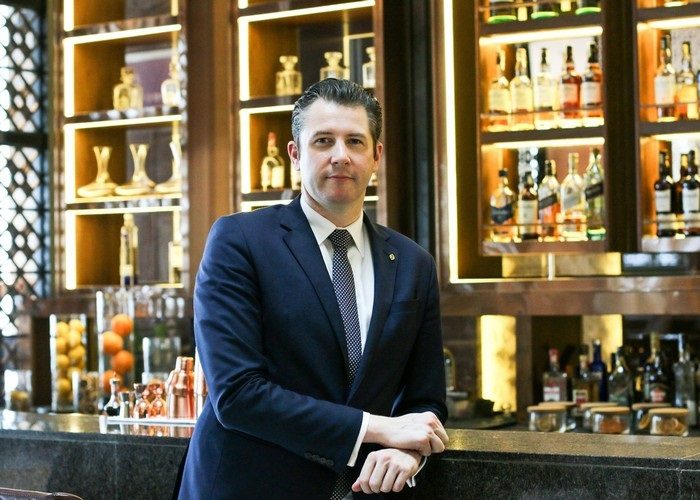
Robbert Mannusen, Area General Manager Taiwan at InterContinental Hotels Group
Change doesn’t happen without them. The key to successful change at InterContinental Kaohsiung was getting supervisors, assistant managers, and managers on board. So they started from the top down by focusing on the processes that would make the biggest positive impact on their daily work.
Solve their problems first. Once they saw how much easier things could be, they were more open and more willing to inspire the rest of the team to use the system too.
Initial adoption: automating approval
When InterContinental Kaohsiung started its operation in Taiwan, Robbert made one thing clear: he didn’t want to see paper. He wanted a fully digital workflow. But in a hotel, that’s a big ask.
Approval memos are everywhere. New restaurant promo? Memo. Changing towel supplier? Memo. Everything goes through that process.
And where did this approval happen? Signature on paper! In most hotels, someone has to run between 3 to 5 departments collecting signatures. If something gets stuck, no one knows where or why. And with stacks of paper lying around, things often get missed.
But at InterContinental Kaohsiung, they skipped all that. From day one, memos were digital, built in Ragic. Approvals are tracked, delays are visible, and automated reminders keep things moving. What was supposed to be chasing papers is now a few clicks.
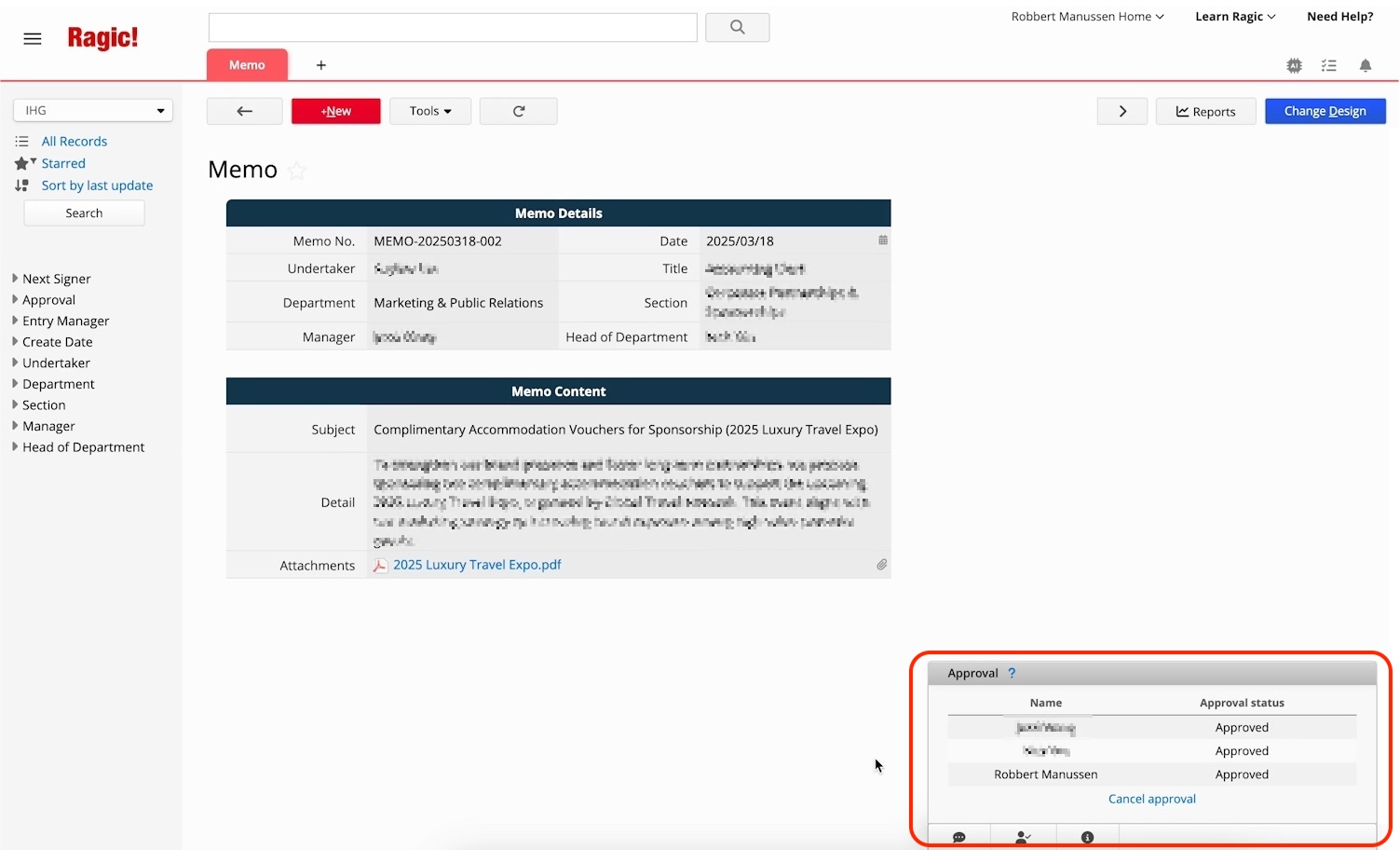
(Approval Flow sample data)
Now bottom-up approach: minibars
This one shows exactly what happens when staff take matters into their own hands.
Have you ever heard of a system designed specifically to manage minibar restocking and track expiration dates? Probably not. It’s super niche—not something you’d name as quickly as CRM software. But in hospitality, it matters. A lot.
InterContinental Kaohsiung didn’t have a system for it. So they used paper. And here’s roughly how that used to go:
- Each housekeeping staff carried an A4 sheet during restocking and manually wrote down expiration dates.
- At the end of the day, those papers were collected, and someone had to manually enter all the data into Excel.
- Another person regularly checked that Excel file to find items expiring within three months.
- But if anything slipped through the cracks, guests could (and did) find expired snacks—leading to not only complaints, but also safety issues.
So the team decided to fix it. They built their own minibar management system in Ragic.
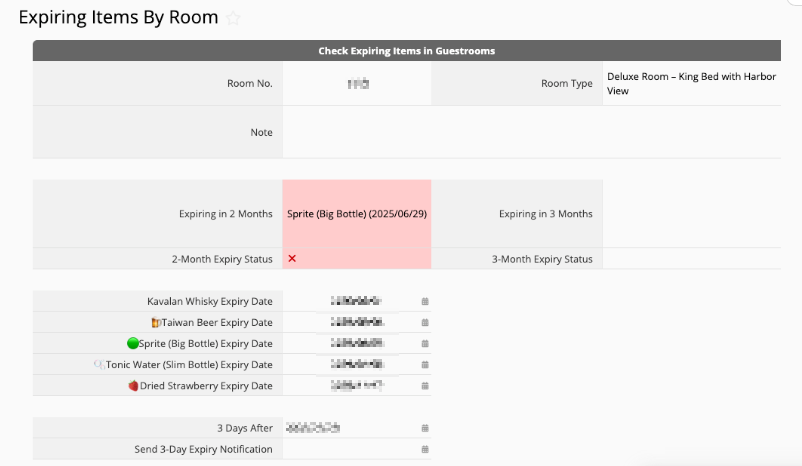
Expiring Items sheet sample data
Now, the workflow looks totally different:
- Housekeeping staff enter data directly into the Ragic app while restocking.
- As they do, they instantly see if any items in that room are expiring within three months, so they can swap them out right away. (This is possible thanks to Formula combined with Link & Load—the system pulls up the list of soon-to-expire items based on the room number entered.)
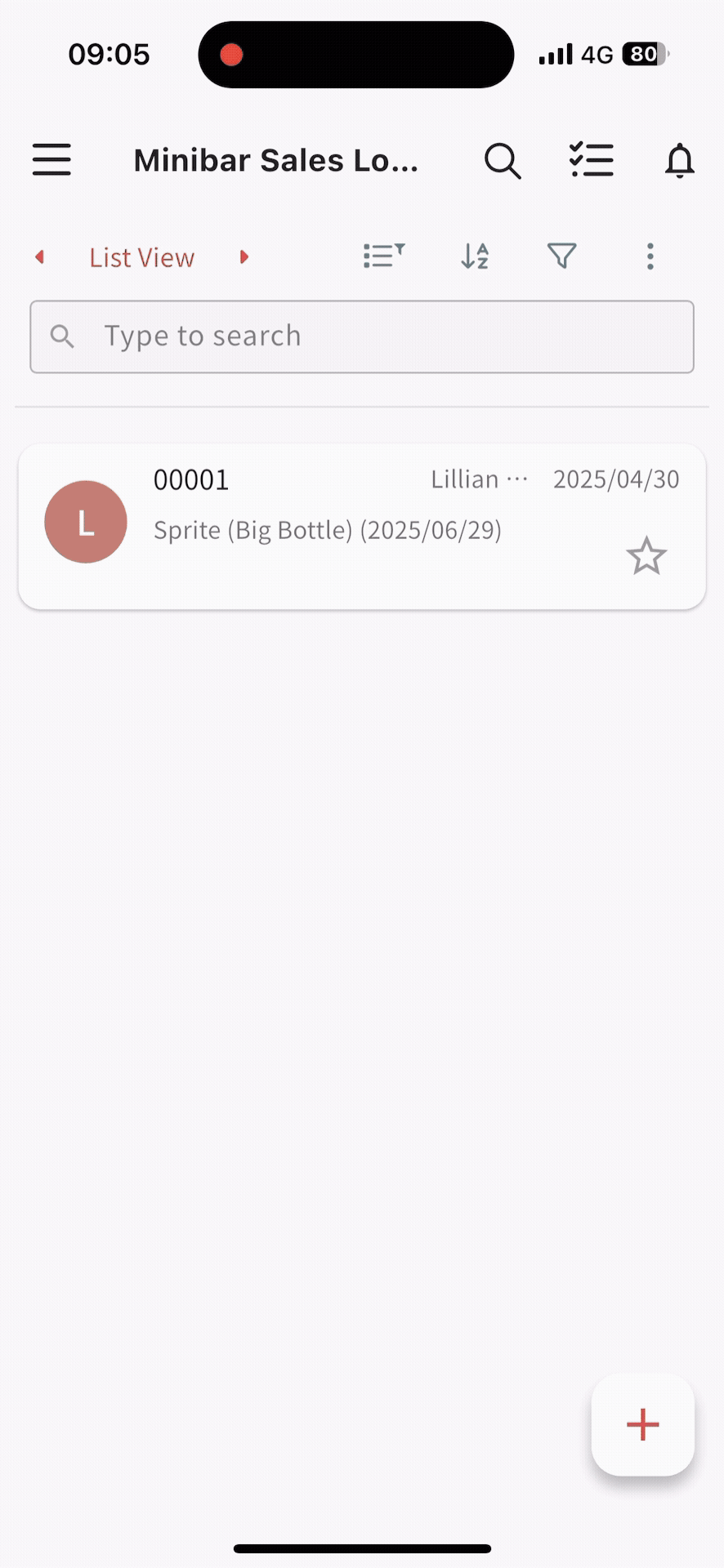
(Minibar workflow sample)
The new setup keeps the original flow of logging restocked items and tracking sales but eliminates the need for: manual paper logs, double entry into Excel, manual tracking of expiring items. And it comes with extra perks:
- It sends notifications when a product is nearing expiry.
- It’s connected to inventory—so when items are restocked, they’re automatically deducted from the housekeeping warehouse.
- It even generates daily and monthly sales reports, with stock updates included.
All of this came from the staff themselves. They saw a problem, and they solved it with a system flexible enough to support their needs. One that isn’t locked into solving a single problem, but is open-ended enough to adapt to any workflow.
Another niche workflow: lost and found management
It’s one of those things that usually gets overlooked. I mean, how complicated can lost and found be. Do you really need a system for that? But think about what happens when the item left behind is something valuable, like a diamond ring (which, let’s be honest, happens..)
Five days goes by, no one picks it up. The item’s already been passed along during multiple shift handovers—night shift, morning shift, then back again. Eventually, someone named George comes to claim it. He says it’s his wife’s ring. Shows proof he was staying in the room on that date. The front desk hands it over.
Two days later, his wife Lina shows up, asking for her ring.
Cue panic.
No one seems to know who gave the ring to George. Front Desk A vaguely remembers someone picking something up, but she was clocking out and didn’t follow through. Front Desk B didn’t even know a diamond ring had been logged in lost and found. Total confusion. They look completely unprofessional.
Lina panics. She calls George, no answer. She starts blaming the front desk. “How could you give it away?! That was my ring!” She shows pictures of herself wearing it. Full meltdown. Two hours of drama unfolds in the lobby witnessed by countless guests.
Eventually, George calls back. He did take the ring. He just forgot to tell Lina and left it on their nightstand. Crisis over—but it could’ve been a disaster.
Sure, things like this don’t happen every day. But when they do? It’s messy, stressful, and makes everyone look bad.
At InterContinental Kaohsiung, that kind of chaos doesn’t happen, because now, even lost and found is managed in Ragic.
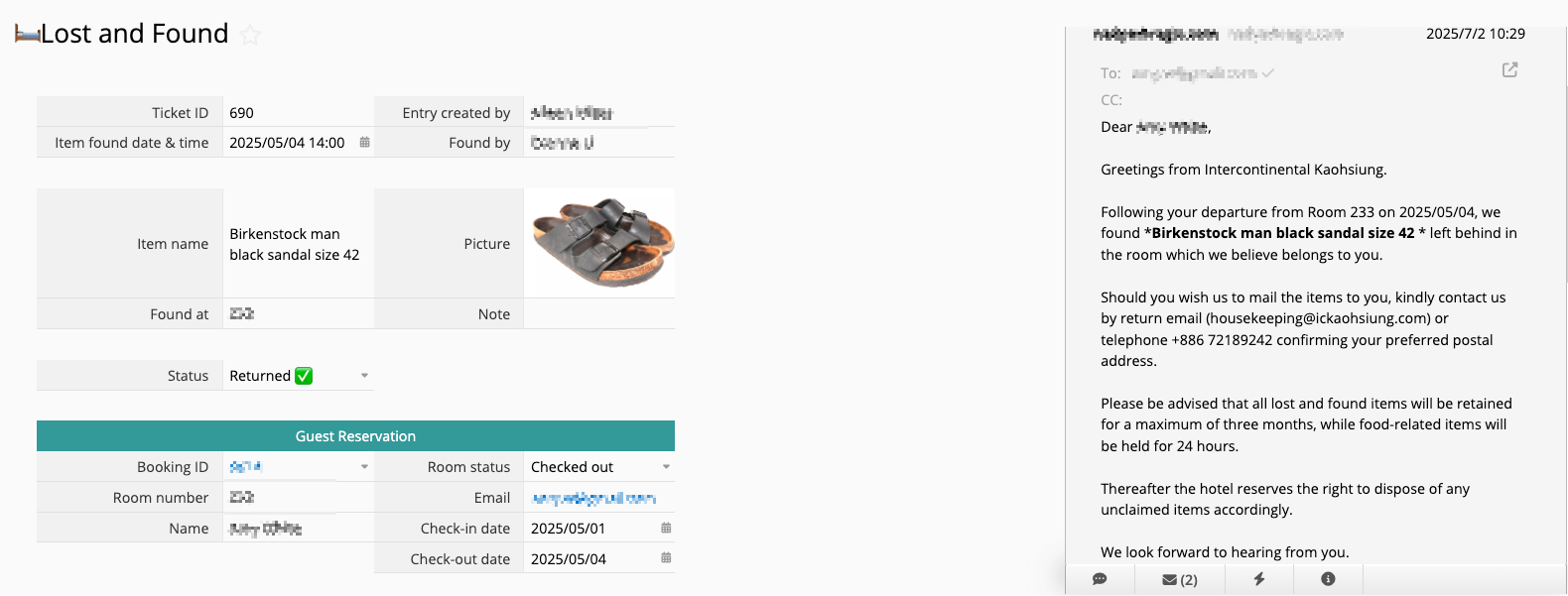
(Lost and Found sample data)
Every item logged into the lost and found system includes who found it, when it was recorded, where it was found, and who it was handed over to. No more guessing games. Every interaction is traceable.
They even set up automatic reminders to notify guests about items they’ve left behind. Instead of chaos and confusion, it’s clarity and accountability.
The future of hospitality and technology
“Innovation is exciting, and there’s a lot to come. You can expect us to be at the forefront,”
says Robbert Mannusen, reflecting on how technology will continue to shape the future of hospitality—and how InterContinental Kaohsiung is ready to lead the way.
Now that so much of their operational data is tracked and stored in Ragic, Robbert sees even greater potential ahead.
“Financial data is important. Every morning we get a pickup report—how much we picked up, where we stand. But imagine if that became a live dashboard, constantly updating in real time.”
He envisions that they already have a step ahead, by having all the data saved in Ragic, and with Ragic’s flexibility, there is an opportunity to integrate it with AI that can analyze this data to make smarter, faster decisions:
- Optimizing housekeeping schedules based on room readiness and guest needs
- Monitoring how long it takes to clean a room and reallocating staff on the fly
- Helping guests plan their stay better, like seeing live breakfast crowd levels to avoid the rush
With three hotels of the group already using Ragic, and plans to open 30 more by 2027, Robbert is optimistic about expanding its use across the group. What started as a digital transformation at InterContinental Kaohsiung is now setting the foundation for a smarter, more adaptive future across the chain in Taiwan.
Category: Case Studies > Services



